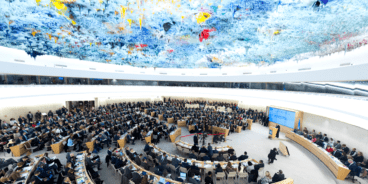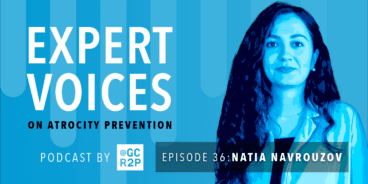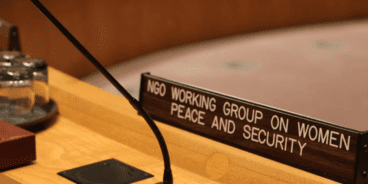
Halabja, Chemical Weapons and the Genocide Against the Kurds: Implications for Iraq and the World Today
Keynote Address delivered by Dr. Simon Adams, Executive Director of the Global Centre for the Responsibility to Protect, at a conference to mark the 30th anniversary of the attack on Halabja, Hosted by the Kurdistan Regional Government Representation in the United States, Washington, D.C., 13 March 2018.
Thank you to Representative Bayan Sami Abdul Rahman and the Kurdistan Regional Government for inviting me to speak today. Thank you also to the brave genocide survivors who have been able to join us here.
On 16 March, thirty years ago, in the midst of the brutal war between Iraq and Iran, the Government of Iraq, under dictator Saddam Hussein, carried out an assault on the Kurdish town of Halabja. The town was under control of Kurdish Peshmerga at the time, supported by Iranian military forces. The attack was framed by Iraqi forces as a conventional attack on pro-Iranian insurgents.
Yet this was a false narrative – what took place in Halabja was an act of genocide. An estimated 5,000 people died on 16 March from the lethal mix of mustard gas, sarin and a VX nerve agent dropped on the town. The vast majority of those who perished were unarmed men, women and children. Thousands more have continued to suffer long-term medical complications from exposure to chemical weapons, such as Muhammad Aziz whose powerful testimony we just heard.
The attack on Halabja was the most notorious, deadliest poison gas attack against the Kurds. And it is also worth noting that Iraq became the first government to ever attack its own cities with chemical weapons.
However, the horrific attack on Halabja was just one atrocity within a much wider campaign of extermination directed against the Kurds of northern Iraq. For decades the Iraqi government had enforced a policy of “Arabization” in northern Iraq, and thousands of Kurdish civilians had been forcibly displaced, disappeared and extrajudicially executed.
Halabja epitomizes the dramatic escalation of state-sponsored violence against the Kurds in the late 1980s, under the direction of Ali Hassan Al-Majid – or “Chemical Ali.” Iraqi government forces used illegal and indiscriminate chemical weapons to solve the country’s so-called “Kurdish Problem.” Nearly half of the 80,000 Kurds living in Halabja before the attack had been driven to the town because of the systemic destruction of other rural Kurdish villages by the government. An estimated 100,000 more civilians were killed in the government’s brutal Anfal campaign and over 4,000 villages destroyed by 1989.
Yet, the international community was hesitant to label this widespread and systematic campaign of atrocities as “genocide,” despite the abundance of evidence. As former US Ambassador to the United Nations, Samantha Power, once wrote, “Kurdish civilians were rounded up and executed or gassed not because of anything they as individuals did, but simply because they were Kurds.”
The mass murder and forced disappearance of tens of thousands of civilians and the obliteration of Kurdish communities demonstrated a deliberate attempt to destroy, in whole or in part, a way of life and a people. The question of intent – integral to the crime of genocide and often so difficult to prove – was startlingly clear in the decrees, directives and actions of the Iraqi security forces at the time. Documents issued from al-Majid’s office explicitly demanded his forces “kill the largest number of persons present” in the Kurdish north.
Clearly, the objective was to eliminate members of the Kurdish ethnic group, and deliberately inflict conditions of life calculated to bring about their physical destruction. Nevertheless, little action was taken by the international community in response.
The warning signs ahead of Halabja and the Anfal campaign were clear. The systematic oppression of the Kurds had been routine practice for decades, and brutal campaigns of violence against civilians by Saddam Hussein’s forces were not unusual. Only a few years earlier, as many as 8,000 men and boys from the Kurdish Barzani clan were abducted and summarily executed.
The Iraqi government, under Saddam Hussein, had also already demonstrated its willingness to use chemical weapons against Iranian military forces and civilians – UN Fact Finding teams sent to the Gulf throughout the 1980s produced seven separate findings regarding the use of chemical weapons.
The Iraqi government operated with impunity. In February of 1986 the UN Security Council passed Resolution 582 “deploring” the use of chemical weapons in the Iran-Iraq war, but little was done to actually end the use of these illegal and indiscriminate weapons. This failure of the international community to hold the Iraqi government responsible for its past atrocities only emboldened Saddam Hussein, Al-Majid and other members of the government to perpetrate further war crimes, crimes against humanity and ultimately, genocide.
This dynamic is eerily reminiscent of what we are witnessing today in Syria, South Sudan, Myanmar and elsewhere – where once again, state forces blatantly and deliberately attack civilian populations and yet little is being done to halt the violence.
Standing here today speaking about Halabja, my thoughts and my heart go out to the 393,000 people of Eastern Ghouta who are besieged, and under attack from President Assad of Syria and his Russian and Iranian allies. They have endured no less than seven chemical weapons attacks so far this year. And in the same way that no government today can plead ignorance to the atrocities being inflicted upon Syrian, South Sudanese and Rohingya civilians, no policymaker could have really made the argument in 1988 that they were totally unaware of the systematic campaign of destruction being perpetrated against the Kurds of Iraq. In general, if governments didn’t know about what Saddam was doing to the Kurds, it was because they didn’t want to know.
Beyond governmental and United Nations reports, articles detailing the use of chemical weapons by the Iraqi government were published on the front pages of the Washington Post and the LA Times. Images of the lifeless bodies of victims – women and children – were featured in major news outlets, and the New York Times editorial page demanded international action.
By 1988, 98 states had ratified the Genocide Convention – including the United States – thereby pledging to take action under the UN Charter to prevent and punish acts of genocide. But many states hid behind Iraq’s own narrative of “counterinsurgency operations” and unavoidable civilian casualties in a time of war. A systematic policy of targeting and killing Kurdish civilians was treated as if it were a reasonable attempt to suppress a rebellion.
After the war between Iraq and Iran ended and Saddam Hussein’s government fell out of favor with many of its allies, attempts at justice for the Kurds continued to be thwarted. The noble efforts of Human Rights Watch to file genocide charges before the International Court of Justice were unsuccessful. No Iraqi soldier or political leader was held accountable for these crimes until the 2003 U.S. invasion of Iraq and subsequent trials of senior government officials – trials widely viewed as flawed and lacking in credibility.
Which brings me to what the Global Centre and many others have identified as one of the central causes for the cycle of violence that has plagued Iraq – the failure to adequately address past injustices and to overcome inter-communal grievances.
Without the genuine pursuit of justice and reconciliation between the various ethnic and religious communities within Iraq, lasting peace cannot and will not be achieved.
Following the fall of Saddam Hussein and the formation of a new government, concrete steps should have been taken to address the legitimate grievances of Iraq’s Shia, Sunni, Kurdish and other minority communities – yet the opportunity was squandered.
The security vacuum created by the disbanding of Iraqi security forces heralded a decade of profound violence in which over 100,000 people were killed. The actions of armed extremists were confronted through the narrow framework of counter-terrorism, rather than utilizing responses informed by an atrocity prevention lens.
As Iraq descended once again into bloodshed, the broader international community was coalescing around the idea that with sovereignty comes a responsibility to prevent and end atrocities – both domestically and internationally.
In 2005 the UN General Assembly unanimously adopted the World Summit Outcome Document, which stipulated that all governments have a responsibility to protect their populations from mass atrocity crimes, and assist other states in upholding their responsibility to do so. When a state fails or is unwilling to protect its people, the international community has an obligation to take collective action, in accordance with the UN charter.
Prior to 2014 there were many voices within international civil society warning of the increasing risk of atrocities within Iraq. The Global Centre, for example, published reports saying that Iraqi civilians faced an imminent risk of atrocities in 2013, a year before Da’esh swept across the Nineveh Plain.
Yet again, in spite of clear warning signs, the government and the international community failed to take action. In the summer of 2014, the so-called Islamic State in Iraq and the Levant (ISIL, ISIS or Da’esh), launched a systematic campaign of mass atrocities in northern Iraq. Consequently, Iraq suffered its second genocide in three decades.
By 3 August 2014 ISIL reached Sinjar City and many other towns and villages in the region that were home to a significant population of Yazidis, a distinct ethno-religious minority group with centuries of heritage. In the weeks that followed ISIL captured thousands of members of the Yazidi community, summarily executed hundreds of men and subjected thousands of women and girls to prolonged physical abuse, sexual violence and enslavement. Yazidi boys were separated from their families, forced to convert to Islam and to fight for ISIL. Sites of religious and cultural significance to Yazidis were deliberately destroyed.
At least eight governments, including the Kurdistan Regional Government, have recognized this campaign as a genocide. And in June 2016 the UN Commission of Inquiry on Syria also issued a report describing ISIL’s campaign against the Yazidi people as a genocide.
Unlike what we witnessed following Halabja, the international community did take decisive action to respond in 2014. Following a request from the Iraqi government, on 8 August the United States began airstrikes against ISIL positions around Sinjar “to prevent a potential act of genocide,” according to President Barack Obama.
This action then led to the formation of an international military coalition to support Iraqi and Kurdish military efforts to defeat ISIL. By November of last year ISIL had lost all the territory of its fraudulent “caliphate” in Iraq. But truly defeating ISIL requires more than territorial victory. To truly defeat ISIL, we need to deliver justice for its victims and hold its leaders and acolytes accountable for the atrocities they incited, directed and committed.
Yet – as was the case following Halabja and the wider systematic campaign of genocide perpetrated against the Kurds – justice for the victims has been minimal. As of today, the few prosecutions of ISIL members that have been carried out have focused on terrorism-related crimes. The failure to hold perpetrators accountable for genocide, crimes against humanity and war crimes enables a culture of impunity and elevates the risk of recurrence.
We also know from our Yazidi colleagues in Iraq, including the organization Yazda, that many of the mass graves remain unprotected, with vital evidence of ISIL’s atrocities being lost or destroyed. In terms of the dignity of the victims, and the need to secure forensic evidence and prosecute the killers, this is unacceptable.
However, practical steps are being taken to break the cycle of impunity. On 21 September last year the UN Security Council passed Resolution 2379, establishing an Investigative Team to support domestic efforts to hold ISIL accountable by collecting and preserving evidence of its atrocities in Iraq.
The Global Centre worked closely with our Yazidi friends (including survivors of the genocide), with the Iraqi and UK governments and with other UN Security Council members, for the establishment of the investigative mechanism. This is a first step on the long path towards justice for victims of atrocities. But we are approaching yet another key turning point in the history of Iraq.
ISIL has been defeated. In May this year Iraq will hold national elections.
Regardless of who wins, there is now a historic opportunity. The new government should, with international support, pursue justice for all victims of atrocities throughout the country, and facilitate comprehensive reconciliation between the many ethnic and religious communities of Iraq. Ensuring due process in accordance with international law remains essential, and the government of Iraq should adopt enabling legislation to fully incorporate genocide, war crimes and crimes against humanity into domestic law.
There also remains an urgent need for coordinated physical protection of those populations who remain at-risk of further violence, including religious minorities such as the Yazidi, but also Sunni civilians at risk of reprisals in territory recaptured from ISIL. If the opportunity to promote reconciliation is not seized, we know what will happen – the cycle of conflict, violence and atrocities will repeat itself.
But Iraq does not have to be a prisoner of its history. A better, freer Iraq is possible. An Iraq that not only acknowledges the pain and suffering of the past, but upholds its responsibility to protect all its diverse peoples. An Iraq where no ethnic or religious community is marginalized or silenced.
And so, on this sad anniversary, as we remember those Kurdish victims who died at Halabja and during the genocidal Anfal campaign, we should recommit ourselves to achieving true justice for all victims of atrocities in Iraq and the world today.
Thank you.
Related Publications


